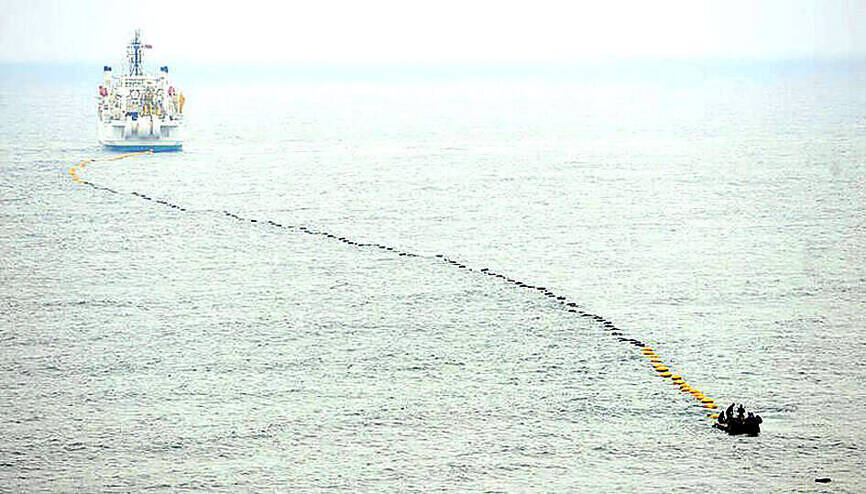Taiwan needs to streamline the application process for new undersea cables to “encourage more investment,” while also prioritizing the protection of critical underwater infrastructure against China’s “gray zone” threats, the head of the Taiwan Network Information Center (TWNIC) said yesterday.
In a speech at the TWNIC Engagement Forum in Taipei, TWNIC chairman Kenny Huang (黃勝雄) said that Taiwan “currently has only 14 [international] submarine cables, with one or two more in the pipeline — but can we encourage more investment for submarine cables?”
Huang has previously described Taiwan’s 14 international and 10 domestic undersea communication cables — which carry 99 percent of the nation’s Internet traffic — as a “digital lifeline.”

Photo: Taipei Times
While the international cables are mostly built through joint ventures involving multiple global companies, all domestic cables are owned and operated by Chunghwa Telecom, the nation’s largest telecom, according to the Ministry of Digital Affairs, which oversees nonprofit organization TWNIC.
Huang said there are “a lot of processes” involved in applying to set up a new undersea cable, whether by international or domestic companies, with approval required from multiple government agencies, including the National Communications Commission, the Ministry of the Interior and the Ministry of Culture.
A presentation shown by Huang showed that the approval process for an application to conduct an underwater cultural heritage survey takes about eight months at the Ministry of Culture, while approval of the completed report can take up to 12 months.
The same slide also showed that Taiwan’s application for permits for system inspections takes an average of 29 months, more than double the Asia-Pacific regional average of 14 months.
“The review process includes many unnecessary steps,” Huang said, citing the example of the underwater cultural heritage survey, which he suggested could instead be submitted only if underwater heritage is actually discovered, a practice adopted by other nations in the region, such as Japan, the Philippines and Australia.
Huang also touched on the protection of critical underwater infrastructure, which includes power cables, oil pipelines and undersea communication cables, spanning from Taiwan’s territorial waters to its exclusive economic zone and further into the high seas.
Huang said “new capabilities” are needed, as the underwater domain is a natural theater for China’s “gray zone” activities.
“One moment, nothing seems to be happening, and the next, the entire cable is gone — and you would not even see it happen,” Huang said. “There are too many vehicles and tools capable of carrying out such an operation, including uncrewed vehicles and uncrewed vessels.”
On whether Taiwan can defend its critical underwater infrastructure, Huang said the government should develop a national strategy to protect it, with priorities set according to available resources.

TRAFFIC SAFETY RULES: A positive result in a drug test would result in a two-year license suspension for the driver and vehicle, and a fine of up to NT$180,000 The Ministry of Transportation and Communications is to authorize police to conduct roadside saliva tests by the end of the year to deter people from driving while under the influence of narcotics, it said yesterday. The ministry last month unveiled a draft of amended regulations governing traffic safety rules and penalties, which included provisions empowering police to conduct mandatory saliva tests on drivers. While currently rules authorize police to use oral fluid testing kits for signs of drug use, they do not establish penalties for noncompliance or operating procedures for officers to follow, the ministry said. The proposed changes to the regulations require

Taipei, New Taipei City, Keelung and Taoyuan would issue a decision at 8pm on whether to cancel work and school tomorrow due to forecasted heavy rain, Keelung Mayor Hsieh Kuo-liang (謝國樑) said today. Hsieh told reporters that absent some pressing reason, the four northern cities would announce the decision jointly at 8pm. Keelung is expected to receive between 300mm and 490mm of rain in the period from 2pm today through 2pm tomorrow, Central Weather Administration data showed. Keelung City Government regulations stipulate that school and work can be canceled if rain totals in mountainous or low-elevation areas are forecast to exceed 350mm in

EVA Airways president Sun Chia-ming (孫嘉明) and other senior executives yesterday bowed in apology over the death of a flight attendant, saying the company has begun improving its health-reporting, review and work coordination mechanisms. “We promise to handle this matter with the utmost responsibility to ensure safer and healthier working conditions for all EVA Air employees,” Sun said. The flight attendant, a woman surnamed Sun (孫), died on Friday last week of undisclosed causes shortly after returning from a work assignment in Milan, Italy, the airline said. Chinese-language media reported that the woman fell ill working on a Taipei-to-Milan flight on Sept. 22

1.4nm WAFERS: While TSMC is gearing up to expand its overseas production, it would also continue to invest in Taiwan, company chairman and CEO C.C. Wei said Taiwan Semiconductor Manufacturing Co (TSMC) has applied for permission to construct a new plant in the Central Taiwan Science Park (中部科學園區), which it would use for the production of new high-speed wafers, the National Science and Technology Council said yesterday. The council, which supervises three major science parks in Taiwan, confirmed that the Central Taiwan Science Park Bureau had received an application on Friday from TSMC, the world’s largest contract chipmaker, to commence work on the new A14 fab. A14 technology, a 1.4 nanometer (nm) process, is designed to drive artificial intelligence transformation by enabling faster computing and greater power